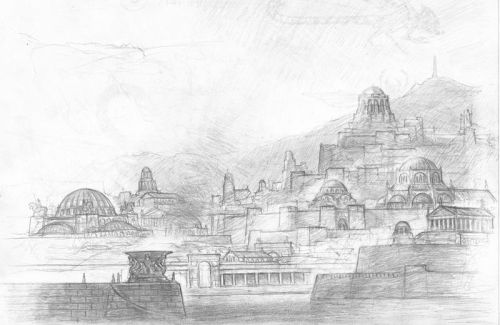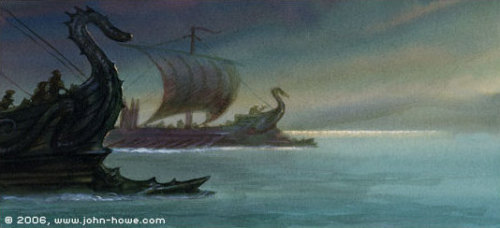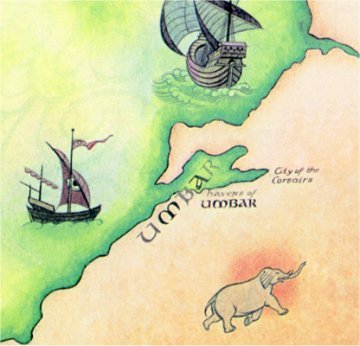tolkienmatters: Umbar was a major Númenorean port city in Harad,…
Thursday, November 28th, 2019


Umbar was a major Númenorean
port city in Harad, off the Bay of Belfalas, that went from a major Gondorian trading port to a pirate haven. Founded by the Númenóreans during their colonizing of Middle Earth, under Ar-Pharazôn it was the staging point for his invasion and subjugation of Sauron. When Númenor collapsed the city came under the control of the King’s Men (Black Númenóreans who sided with the dark cult of Morgoth). With
Númenor destroyed and the remaining Númenorean colonies under control of
the Faithful (Those who stayed loyal to the Valar), Umbar became more closely
aligned with Morgoth’s other allies such as neighboring Harad. By the beginning
of the Third Age the city remained under Gondor’s control, and they were able
to repel many of the Harad invasions until the Kin-strife (Castamir’s attempt to seize power). The civil war weakened Gondor and allowed Umbar to become independent and the city become a corsair haven. The Corsairs of Umbar
were a mix of the King’s Men, Castamir the Usurper’s supporters from the Kin-strife, and local
Haradrim who joined the powerful city-state. Gondor was not able to reclaim the
city for hundreds of years due to the Great Plague, Mordor’s incursions into
Ithilien, and Corsair raids along the Belfalas coast. Significant battles in
the latter half of the Third Age include The Corsair raid on Pelargir which killed King Minardil. Minardil’s ancestor King Umbardacil briefly recapturing Umbar but
being ousted by the Haradrim, and Thorongil (Aragorn) leading
a raid that sabotaged the Corsair fleet just prior to the War of the Ring.
During the War of the Ring Umbar had joined Sauron and sent their remaining
fleet to attack Gondor, however Aragorn summoned the Army of the Dead
(Oathbreakers from the Second Age) to frighten and ultimately rout the
Corsairs. With the destruction of Sauron came the scattering and ruin of his
cult, and Umbar fell back into the fold of the Reunited Kingdom. Aragorn 2, Corsairs 0.“There at
Pelargir lay the main fleet of Umbar, fifty great ships and smaller vessels
beyond count. Many of those that we pursued had reached the havens before us,
and brought their fear with them; and some of the ships had put off, seeking to
escape down the River or to reach the far shore; and many of the smaller craft
were ablaze. But the Haradrim, being now driven to the brink, turned at bay,
and they were fierce in despair; and they laughed when they looked on us, for
they were a great army still.‘But
Aragorn halted and cried with a great voice: “Now come! By the Black Stone I
call you! “ And suddenly the Shadow Host that had hung back at the last came up
like a grey tide, sweeping all away before it. Faint cries I heard, and dim
horns blowing, and a murmur as of countless far voices: it was like the echo of
some forgotten battle in the Dark Years long ago. Pale swords were drawn; but I
know not whether their blades would still bite, for the Dead needed no longer
any weapon but fear. None would withstand them.‘To every
ship they came that was drawn up, and then they passed over the water to those
that were anchored; and all the mariners were filled with a madness of terror
and leaped overboard, save the slaves chained to the oars. Reckless we rode
among our fleeing foes, driving them like leaves, until we came to the shore.
And then to each of the great ships that remained Aragorn sent one of the
Dúnedain, and they comforted the captives that were aboard, and bade them put
aside fear and be free.”– Gimli
telling how the Three Hunters captured the Corsairs’ ships. Return of the King, The Last Debate
Reposted from https://lies.tumblr.com/post/189356840510.
